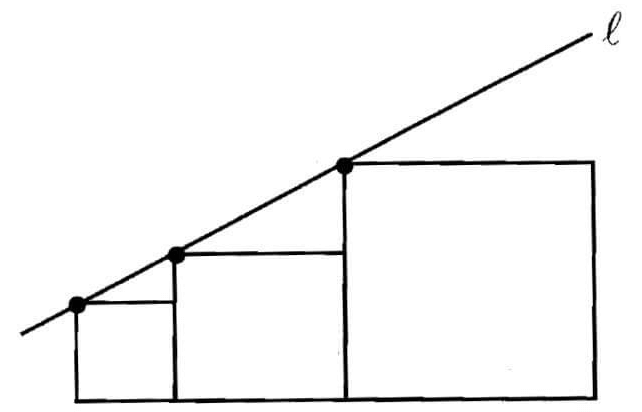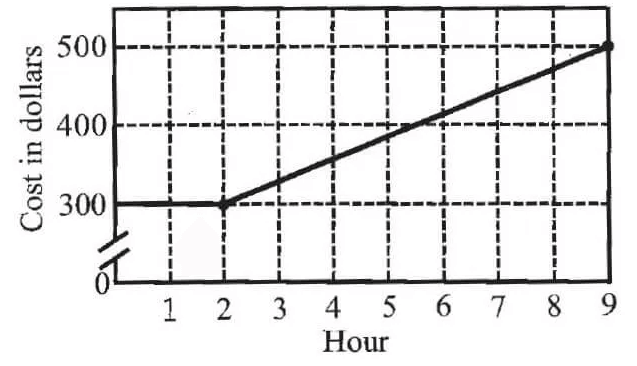DIVIDING DECIMALS
Jasmine was preparing a design to decorate her classroom. She needed a few colored strips of paper of length 1.8 cm each. She had a strip of colored paper of length 7.2 cm.
How many pieces of the required length will she get out of this strip ?
She thought it would be 7.2/1.8.
Is she correct ?
Both 7.2 and 1.8 are decimal numbers. So we need to know the division of decimal numbers.
For example,
141.5 ÷ 10 = 14.15
141.5 ÷ 100 = 1.415
141.25 ÷ 1000 = 0.1415
To get the quotient, we shift the decimal point in the decimal number to the left by as many places as there are zeros over 1.
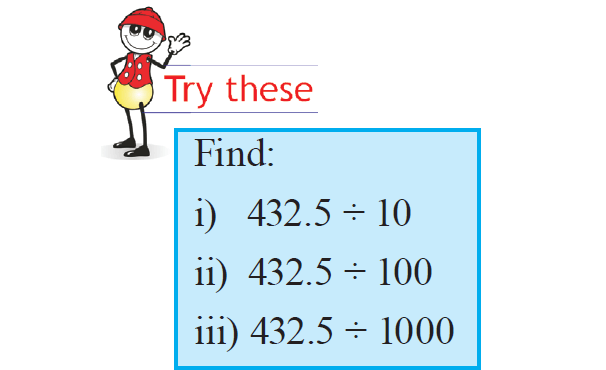
Dividing Decimals by Whole Numbers
Method 1 :
Find 4.2 ÷ 3.
Solution :
4.2 ÷ 3 = ⁴²⁄₁₀ ÷ 3
4.2 ÷ 3 = ⁴²⁄₁₀ ÷ ⅓
4.2 ÷ 3 = ¹⁴⁄₁₀
4.2 ÷ 3 = 1.4
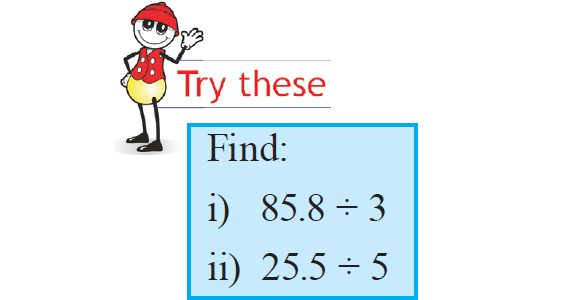
Method 2 :
Find 18.5 ÷ 5
Solution :
First, let us find 185 ÷ 5. We get 37
There is one digit to the right of the decimal point in 18.5.
Place the decimal point in 37 such that there would be one digit to its right. We will get 3.7
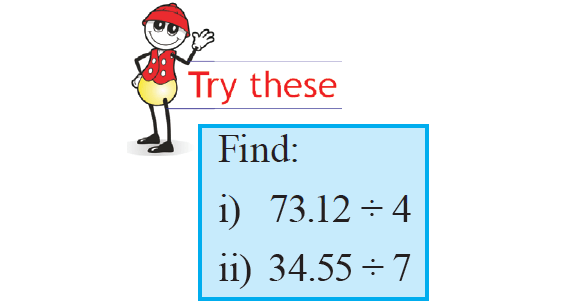
Dividing Decimals by Decimals
Example 1 :
Evaluate :
17.6 ÷ 0.4
Solution :
17.6 ÷ 0.4 = ¹⁷⁶⁄₁₀ ÷ ⁴⁄₁₀
Change division to multiplication and take reciprocal of the fraction ⁴⁄₁₀.
= ¹⁷⁶⁄₁₀ x 10⁄4
Simplify.
= ¹⁷⁶⁄₁ x 1⁄4
= ¹⁷⁶⁄4
= 44
Example 2 :
Evaluate :
1.2 ÷ 0.2
Solution :
1.2 ÷ 0.2 = 12⁄10 ÷ 2⁄10
Change division to multiplication and take reciprocal of the fraction 2⁄10.
= 12⁄10 x 10⁄2
Simplify.
= 12⁄1 x 1⁄2
= 12⁄2
= 6
Example 3 :
Evaluate :
1.8 ÷ 0.03
Solution :
1.8 ÷ 0.03 = 18⁄10 ÷ 3⁄100
Change division to multiplication and take reciprocal of the fraction 3⁄100.
= 18⁄10 x 100⁄3
Simplify.
= 6⁄1 x 10⁄1
= 6 x 10
= 60
Solved Problems
Problem 1 :
Evaluate :
1.8 ÷ 0.3
Solution :
1.8 ÷ 0.3 = ¹⁸⁄₁₀ ÷ ³⁄₁₀
Change division to multiplication and take reciprocal of the fraction ³⁄₁₀.
= ¹⁸⁄₁₀ x ¹⁰⁄₃
Simplify.
= ⁶⁄₁ x ¹⁄₁
= 6 x 1
= 6
Problem 2 :
Evaluate :
2.4 ÷ 0.6
Solution :
1.2 ÷ 0.2 = ²⁴⁄₁₀ ÷ ⁶⁄₁₀
Change division to multiplication and take reciprocal of the fraction ⁶⁄₁₀.
= ²⁴⁄₁₀ x ¹⁰⁄₆
Simplify.
= ⁴⁄₁ x ¹⁄₁
= 4 x 1
= 4
Problem 3 :
Evaluate :
3.6 ÷ 0.006
Solution :
3.6 ÷ 0.006 = ³⁶⁄₁₀ ÷ ⁶⁄₁₀₀₀
Change division to multiplication and take reciprocal of the fraction ⁶⁄₁₀₀₀.
= ³⁶⁄₁₀ x ¹⁰⁰⁰⁄₆
Simplify.
= 6⁄1 x ¹⁰⁰⁄₁
= 6 x 100
= 600
Problem 4 :
Evaluate :
3782.56 ÷ 10
Solution :
Since 3782.56 is divided by 10, the decimal point has to be shifted one digit to the left.
3782.56 ÷ 10 = 378.256
Problem 5 :
Evaluate :
3782.56 ÷ 100
Solution :
Since 3782.56 is divided by 100, the decimal point has to be shifted two digits to the left.
3782.56 ÷ 10 = 37.8256
Problem 6 :
Evaluate :
3782.56 ÷ 1000
Solution :
Since 3782.56 is divided by 1000, the decimal point has to be shifted three digits to the left.
3782.56 ÷ 1000 = 3.78256
Problem 7 :
Evaluate :
2.87 ÷ 10
Solution :
Since 2.87 is divided by 10, the decimal point has to be shifted one digit to the left.
2.87 ÷ 10 = 0.287
Problem 8 :
Evaluate :
3.65 ÷ 100
Solution :
Since 3.65 is divided by 100, the decimal point has to be shifted two digits to the left.
But, there is only one digit '3' to the left of the decimal point in 3.65. To get one more digit to the left of the decimal point, add one zero.
3.65 ÷ 100 = 0.0365
Problem 9 :
Evaluate :
7.5 ÷ 1000
Solution :
Since 7.5 is divided by 1000, the decimal point has to be shifted three digits to the left.
But, there is only one digit to the left of the decimal point in 7.5. To get two more digits to the left of the decimal point, add two zeros.
7.5 ÷ 1000 = 0.0075
Problem 10 :
Evaluate :
0.3 ÷ 100
Solution :
Since 0.3 is divided by 100, the decimal point has to be shifted two digits to the left.
But, there is no digit to the left of the decimal point in 0.3. To get two digits to the left of the decimal point, add two zeros.
0.3 ÷ 100 = 0.003
Problem 11 :
Evaluate :
0.005 ÷ 1000
Solution :
Since 0.005 is divided by 1000, the decimal point has to be shifted three digits to the left.
But, there is no digit to the left of the decimal point in 0.005. To get three digits to the left of the decimal point, add three zeros.
0.005 ÷ 1000 = 0.000005
Problem 12 :
Evaluate :
49 ÷ 0.07
Solution :
= 49 ÷ 0.07
= 49 ÷ ⁷⁄₁₀₀
Change division to multiplication and take reciprocal of the fraction ⁷⁄₁₀₀.
= 49 x ¹⁰⁰⁄₇
Simplify.
= 7 x ¹⁰⁰⁄₁
= 7 x 100
= 700
Problem 13 :
Evaluate :
6.5 ÷ 5
Solution :
= 6.5 ÷ 5
= ⁶⁵⁄₁₀ ÷ ⁵⁄₁
Change division to multiplication and take reciprocal of the fraction ⁵⁄₁.
= ⁶⁵⁄₁₀ x ⅕
Simplify.
= ¹³⁄₁₀ x ¹⁄₁
= ¹³⁄₁₀
Since 13 is divided by 10, there should be one digit to the right of the decimal point in the answer.
= 1.3
Problem 14 :
A car covers a distance of 129.92 miles in 3.2 hours. What is the distance covered by it in 1 hour ?
Solution :
Distance covered by the car = 129.92 miles
Time required to cover this distance = 3.2 hours
So, distance covered by it in 1 hour :
= 129.92/3.2
Multiply both numerator and denominator by 100 to get rid of the decimal points.
= 12992⁄320
= 40.6 miles
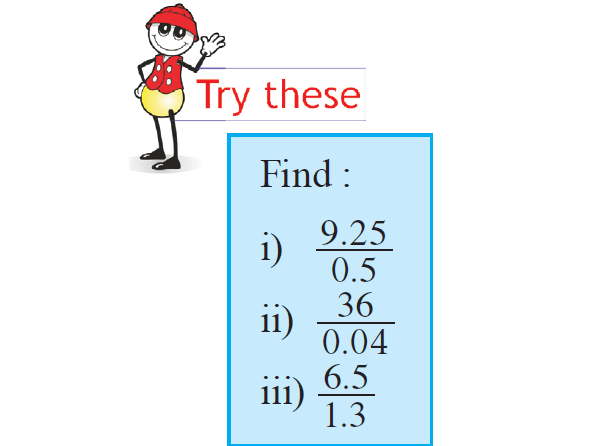
Practice Questions
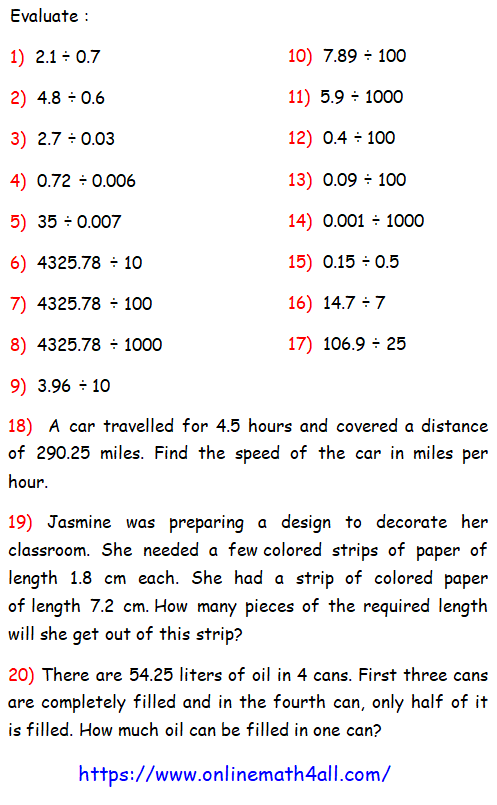
Click here to get detailed answers for the above questions.
Kindly mail your feedback to v4formath@gmail.com
We always appreciate your feedback.
©All rights reserved. onlinemath4all.com
Recent Articles
-
Digital SAT Math Problems and Solutions (Part - 146)
Apr 18, 25 06:52 AM
Digital SAT Math Problems and Solutions (Part - 146) -
Logarithmic Derivative Problems and Solutions
Apr 16, 25 09:25 PM
Logarithmic Derivative Problems and Solutions -
Digital SAT Math Problems and Solutions (Part - 145)
Apr 16, 25 12:35 PM
Digital SAT Math Problems and Solutions (Part - 145)
